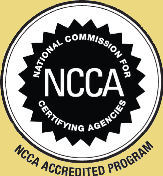December 2008 – This year marks the tenth anniversary of accreditation for the National Commission for the Certification of Crane Operators (NCCCO).
NCCCO first received accreditation from the National Commission for Certifying Agencies (NCCA) in 1998. Since then, in addition to annual audits and a complete reaccreditation by NCCA (required every five years), the Commission has been accredited by the American National Standards Institute (ANSI) to the exacting standards of international personnel certification standard ISO 17024.
Accreditation by an accrediting agency established to review personnel certification programs is essential to the fairness and credibility of a credential like CCO certification, said NCCCO Executive Director, Graham Brent. “Only in this manner can an employer be guaranteed that the certification his or her employee receives has been developed and administered in a fair, valid and reliable manner.”

In acknowledging the 10-year milestone, Commission Chairman, Kerry Hulse, recalled how the industry had rallied in the aftermath of the 1989 tower crane accident in San Francisco to develop a national standard of certification.
“While they correctly identified the more widespread adoption of training as the key to improving the knowledge and skill of crane operators, the industry recognized the critical role that national certification could play as the means toward that end,” Hulse said.
“Over a decade later, with certification available from multiple sources, NCCCO remains the only non-profit, independently accredited certification organization that meets the needs of the entire industry, regardless of affiliation,” he added. The adoption of CCO crane operator certification by thousands of employers nationwide, and its widespread use by states as the basis for licensing was testimony to its success in meeting its intended safety mission.
“The mission of the “founding fathers” of this organization was essentially three-fold,” Hulse said, “Safety, safety and, again, safety. Improving the safety of personnel who work in, with and around cranes was the single, overarching goal from the inception of NCCCO, and it remains its mission to this day.
Evidence of this safety mission is seen in the Commission’s recent response to the industry’s request for the expansion of its certification activities to other personnel who work around lifting equipment. Signalperson certification was launched in October, and rigger certification is set to follow first quarter 2009. Other programs will be developed during the year ahead.
“It goes without saying that a well-executed lift is just as dependent on a load being correctly rigger and the operator being provided with the correct signals, as it is on the crane operator’s skill in handling the load when off the ground,” said NCCCO Executive Director Brent.
“Given the proven success of CCO certification in mitigating risk in general, and actually reducing the incidence of crane accidents, it was only natural the industry would call for application of the accredited certification principles to other crafts.”